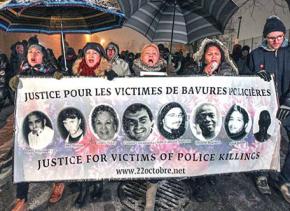Black Lives Matter in Canada
reports from Montreal on the ongoing demonstrations there and in Toronto to stand up against racism and police violence.
BRAVING A spring snowstorm, a young, multiracial and multilingual (French, English and Haitian Creole) crowd gathered in North Montreal April 6 to protest the death of Jean Pierre Bony, a North Montreal resident and Haitian immigrant shot a week earlier by police with a rubber bullet to the head while he was trying to escape a marijuana arrest.
The demonstration followed a rally two hours earlier at the same location to observe the birthday of another North Montreal victim of police murder, Fredy Villanueva, who was killed eight years ago during a drug raid. Like Bony, Villanueva was unarmed.
Undeterred by the weather, the protesters' numbers swelled to 400 as they chanted, "Police partout, justice nul part!" (Police everywhere, justice nowhere!), "On avance, on ne recul pas" (We're going ahead, we're not turning back) and "Black Lives Matter!"
The crowd marched to the spot where Bony was killed to observe a moment of silence. Banners included pictures of Montreal's police victims and the text "Qui nous protegera de la police?" (Who will protect us from the police?)

After the protest ended, there was some property damage done to a local police station, a Banque of Montreal kiosk and parked cars. Even the police admitted that the vandalism was caused by "party crashers," not the demonstrators themselves, but that didn't stop much of the local and national media from claiming that a peaceful protest had "degenerated" into vandalism.
This is a continuation of the same biased media coverage that has criminalized Bony as someone with a long police record, even though no new entries appear after 2010, and Bony was employed at a travel agency at the time of his death.
The real story behind Bony's and Villanueva's tragic deaths is the racism and poverty experienced by North Montreal's residents, especially those who are immigrants or people of color. Some 32 percent of North Montreal population--one-third more than the Island of Montreal overall--lives in poverty, a figure that increases to nearly one-half when only children are counted.
Hasan Parvez Hang, a left-wing independent candidate for North Montreal mayor in the upcoming April 24 elections (who has since withdrawn from the race), described the double standard that persists:
Gilles DeGuire, the last elected mayor of Montreal North, resigned in January when he came under criminal investigation for sexual acts with underage girls. Nevertheless, he will still receive $124,000 in severance benefits. Compare this to the way Jean Pierre Bony was killed for selling marijuana, which Prime Minister Trudeau has promised to legalize anyway.
ON THE same day as the Montreal demonstrations, Toronto Black Lives Matter demonstrators met with Ontario Premier Kathleen Wynne. Wynne invited the activists after they had protested outside her home on April 1 to protest the findings of a special investigation in mid-March that justified last July's police killing of Andrew Loku, a 45-year old South Sudanese immigrant, former child soldier and father of 5.
Loku, who had no police record and was armed only with a hammer, was killed at the low-income housing complex where he lived with other people suffering from mental health issues.
As part of their protests of Loku's tragic death, Black Lives Matter demonstrators camped out in the cold for two weeks in front of Toronto's police headquarters until police poured tar on their belongings and violently ejected them. In the months leading up to these actions, Canadian student activists have shown steadfast solidarity for student anti-racist struggles in the U.S., such as the one that led University of Missouri's president to resign.
"Don't mourn, organize," said Joe Hill, the labor militant and songwriter who was executed by the state of Utah in 1915. By mobilizing around police brutality, Canadian Black Lives Matter activists make Hill's message real and lay the basis for a North American-wide anti-racism movement that unites the struggle against police brutality across borders.
Montreal North resident and Black feminist Robyn Maynard describes this new movement on her blog, and argues why protest needs to continue:
[It appears there [are] two different sets of rules for white- and Black-skinned persons in Canada.
Amid general public acceptance of cannabis use, and Prime Minister Justin Trudeau's well-received plan to decriminalize marijuana, those who grow and sell cannabis are preparing themselves to be legitimate businesspersons, and are represented as burgeoning entrepreneurs in the media. But Black Canadians are still vilified and represented as dangerous criminals for their perceived or real involvement with the same substance [and] continue to be subjected to highly orchestrated, militarized police raids by tactical squads and SWAT team.
Jean-Pierre Bony is dead because of a bust surrounding a substance used recreationally by large numbers of Canadians, across race and class; yet his tragic and unjustifiable death has so far been represented as a minor detail. Black life, after all, is cheap in Canada, and Montreal is not exempt.


